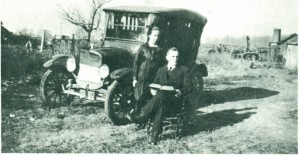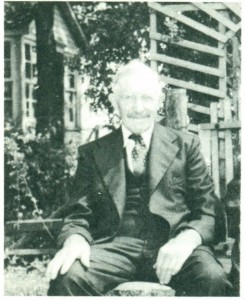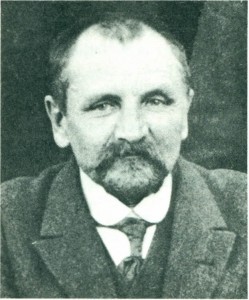The Formal Establishment of the Congregation
While events were taking shape in Essex County, a congregation established in Waterloo in 1925 with Rev. Jacob H. Janzen as leader. The congregation had both its own religious seal and its own register. Despite a distance of 180 miles from Waterloo, the Essex County United Mennonite families decided on full membership in this congregation. In effect Essex County was a branch of the Waterloo congregation. The technical aspects of achieving membership were met when a prospective member answered the following questionnaire:
- Name of congregation to which member belonged in Russia.
- Time and place of emigration from Russia.
- Place of arrival in Canada with name of ocean steamer.
- Time and place of birth, date of baptism and marriage.
- Name of parents.
- Name of children, date and place of birth, and whether baptized.
The head of the family was obliged to sign the questionnaire along with two other persons that had made the recommendation for membership.The completed forms were sent to Waterloo to be entered into the church register. When the Leamington congregations became independent in 1929, the records applying to Leamington were returned and made a part of the local register. The approximately 150 names involved formed the nucleus for the first church register of the Leamington congregation. That register encompassed a period from 1929 to 1952 and contained 505 double pages. The new register begun in 1953 has its entries in English.
A progressive step at this time was Rev. Jacob D. Janzen’s acquisition of a governmental license for the purpose of officiating at marriages. This license was acquired through the efforts of Rev. Janzen of Waterloo. And thus a local minister was available empowered legally to consummate [sic] a marriage. The Brethren Church this time lacked such a minister. The first couples to be married by J. D. Janzen were the following: Peter Willms and Elisabeth Klassen (M. B.) Jan. 17, 1927; Jacob Krahn and Maria Thiesssen, Apr. 8, 1928; Franz Dick and Sara Toews, (Cone. 5), Apr. 22, 1928. By the end of 1928, 10 couples had been married.
The three persons having received baptism in 1925 were already mentioned. They had received some catechetical instruction from Rev. Lohrenz, and Rev. Janzen of Waterloo had counselled them in preparation for baptism. In 1926, Br. Cornelius Tiessen instructed five candidates, and these were baptized on confession of faith on June 13, at Ruthven United Church. Their names follow: Liese Tiessen (Mrs.Peter Janzen, Vineland); Mika Barkowsky, (Mrs. Henry Neufeld, Conc. 4); Henry P. Enns, now in Oakville, Ontario; John Jac. Enns, R.R. 4, Leamington; Henry C. Neufeld, now Conc. 4.
Apparently there were no candidates in 1927, since no evidence of a baptismal service can be found until the years 1928, 1929, and 1930. All baptisms were performed then in the Ruthven Church with Rev. J.H. Janzen officiating on each occasion. Through the generosity of the Ruthven people the church was available gratis on Sunday afternoons. Our gratitude to them for this arrangement is acknowledged here.
Church Councils
A very prudent and practical arrangement instituted instituted by Rev. J. H. Janzen was the church council. Lay members were elected and in conjunction with the ministers deliberated on church issues and carried out decisions made by the general membership. The church councils were an innovative arrangement, not having been in use in Russia. Subsequently, other congregations of Russian Mennonite origin adopted Rev. Janzen’s innovation. Membership on the council varied according to the size of the congregation, but at first the ratio was one to every 25 members. Because term of office in the council was limited then as now, many members received opportunity for church involvement.
The first four years also gave birth to a Sunday school and a church choir although in each case details are obscure. In addition to the previously-mentioned teachers from the Brethren Church, others who served the Sunday school included Jac. Barkowsky, Frank Tiessen, and Miss Mary Dyck. Choir leaders included Henry Paetkau (teacher), Jacob Hamm, Corn. Enns, Rev. Abram Huebert and possibly others.
Two Pioneer Religious Leaders
Two men from the early period deserve a special niche in the history of our church. One, Mr. Cornelius Tiessen, was the mind and soul of the Mennonite immigrants coming to Essex County. His scope of activity ranged from instruction in catechism, youth work and preaching, to counseling and operating and preaching, to counselling and operating a German library. He served with devotion and dedication, but because of his forceful character seemed to function best without assistance from others. As the church grew, and others were ordained to serve, his activities in the church decreased; however on the encouragement of his colleagues he consented to ordination as minister in 1933 and served an additional six years. Unfortunately, in the wake of dissensions and misunderstandings his work in the church ceased. In April, 1968, at the age of 74, he passed on to his reward into the kingdom of the blessed. For his timeless efforts in the pioneer years he deserves full recognition.


The second early religious leader was Rev. Jacob D. Janzen, a man in some respects possessing opposite characteristics to Rev. C. Tiessen’s. One could say of him, “The Lord has given me a tongue that I may know how to sustain with a word him that is weary.” Isa. 50:4. Having been ordained in 1926, he was called to lead the church in 1928. In his gentle, sincere, and plain fashion he continued the work of Cornelius Tiessen. The church treasured his work, and he has continued to serve until the present time, about 45 years since his ordination. Today he still visits the sick and reports on church activities in “Der Bote”.
Other ministers from the initial years were Br. Nicolai Schmidt, Later he found his mission field in Dunnville, Ontario, and Br. John Jac. Dick of Windsor, who soon after being called withdrew his ministerial services.

Minutes of Early Meetings
The following abridged minutes of early meetings will augment what has been said in preceding paragraphs:
Minutes of May 16, 1926 (The earliest minutes available).
Chairman: Corn. Tiessen, Secretary: Gustav Fast.
- Surrendering the Leamington meeting hall (probably the hall In Brown’s Hotel)
- Inviting Rev. J. H. Janzen to services of baptism, communion and ordination on June 13.
- Spring festival- the question remains undecided.
- Formation of a choir. Isaak Tiessen is to register singers.
Minutes of July 25,1926.
Chairman: Corn. Tiessen, Secretary: Gerh. Dick
- Rental payments on hall to be left to each group, but 15 cents for month is to be paid to church treasury by each person receiving communion. These fees will be collected on quarterly basis.
- Each group is to conduct its own services three Sundays per month. On the remaining Sunday groups meet together, alternating between Ruthven and Leamington.
- Congregational song leaders elected: Nicolai N. Tiessen, John Schroeder, ? Huebert, Isaak Unrau, Franz Bartel, Jacob Barkowsky, Jr.
- Sunday school is to operate in each group and in each case before the worship service
Minutes of October 24,1926, in Ruthven.
Chairman: C. Tiessen, Secretary: Isaak Tiessen.
- One dollar to be paid to central treasury in Waterloo. Beyond that, each group responsible for its own expenses.
- Christmas Eve in Leamington and Kingsville
Minutes of April 24, 1927.
Chairman: C. Tiessen, Secretary: Henry Paetkau.
- A temporary concentration of members makes it possible to conduct worship services in the following places: Kingsville, Leamington, and Ruthven. Baptism, communion, etc, to remain in Ruthven.
- A plea for better attendance in the Sunday school.
- Moved by C. Tiessen that a lending library be established.
Minutes of (no day and month) 1927.
Chairman: C. Tiessen, Secretary: Jacob Hamm.
- Those members presently registered shall be considered as the founding member
- Election of deacons: David Unrau – 20 votes (passed away June 25, 1931), Jacob Barkowsky – 17 votes (passed away June 13, 1965), John Rogalsky, ordained in Russia (passed away August 26,1931 ).
- Holidays to be celebrated as in Russia.
- Church council enlarged to ratio of I to 25 members: Jacob J. Toews, Cone. 8, Kornelius Neufeld, Sr., Jacob Funk, Peter Unger, John Schroeder, Abram J. Mathies. (Obviously, membership had risen to 150 members).
Minutes of March 1, 1928.
Chairman: C. Tiessen, Secretary: Jacob Hamm.
- Members elected to church council: Cornelius Enns, Henry H. Koop, Jacob Fr. Toews, Peter Unger, Henry J. Janzen, Abram Willms, Peter J. Tiessen, Sr., Henry Barkowsky, Sr., Jacob J. Toews
Minutes of June 3, 1928, in Kingsville.
Chairman: Cornelius C. Enns, Secretary: John H. Schroeder.
- The issues of smoking and fashion are placed before the assembly. Decision is reached not to smoke in the vicinity of the meeting hall, and parents are encouraged to have a Christian influence with regard to their children’s fashions.
Thus end the first four years of groping, searching and orientating in order to gain a foothold in a strange country. One notices the gregarious nature of the people, their attempts to uphold one another and to adjust to the environment. After the next four year period events will be dealt with in longer time sequences.
